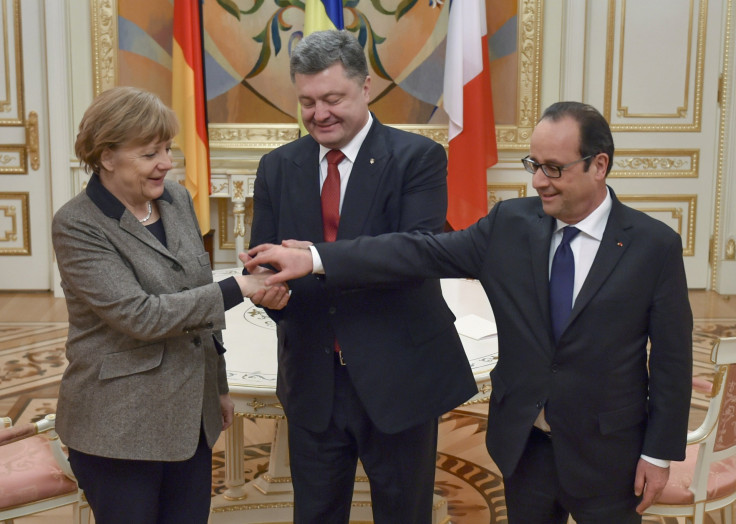Ukraine Crisis: US, European Officials Split Over Sending Arms To Ukraine

Escalated fighting in eastern Ukraine has U.S. and European leaders scrambling for an action plan to deal with the festering crisis. But as American officials face increasing pressure to begin sending arms to Ukrainian fighters, Europeans are balking on the issue, showing signs of a potential division among Western allies if Washington decides to make the move.
Several European defense ministers said Thursday during a NATO meeting that they supported political dialogue over military support as a solution to the crisis. “More weapons in this area will not bring us closer to a solution, and will not end the suffering of the population,” said German Defense Minister Ursula von der Leyen, according to Reuters.
German Chancellor Angela Merkel and French President Francois Hollande have signaled that their countries would not send weapons to fighters in Ukraine. Both leaders traveled to Kiev Thursday to hash out a peace plan, and they are scheduled to meet with Russian President Vladimir Putin Friday.
But U.S. officials reportedly are warming to the idea of sending Ukraine lethal weapons to help them fight Russian-backed rebels, although the White House has signaled that no decisions have been made. Ashton Carter, President Barack Obama’s nominee for secretary of defense, said in his Senate confirmation hearing Wednesday that he was “very much inclined” toward the idea of sending arms to Ukraine. Meanwhile, a joint report by several former U.S. officials urged the administration and NATO members to send “defensive weapons” to Ukraine in order to pressure Russia to come to the negotiating table.
Obama previously dismissed the idea of supplying arms to Ukrainian fighters, but a recent spike in violence in the region and the collapse of a September ceasefire has prompted the administration to consider shifting its course. But some analysts say if the U.S. goes through with the move, European resistance could undermine the ultimate goal of involving Russia in a political solution.
“The price of arming Ukraine is likely to be a rupture in transatlantic solidarity, and therefore the loss of the greatest asset the West has had in this fight to date,” wrote Samuel Greene, director of the King’s Russia Institute at King’s College London, in a piece for Carnegie Europe.
But Steven Pifer, former U.S. ambassador to Ukraine and a co-author of the independent report that came out earlier this week, said the U.S.’ and Europe’s end goals on Ukraine remained the same despite the weapons issue. “The goal of providing more military assistance, including defensive arms to Ukraine, is to raise the cost to Russia to the point where Russia goes to a diplomatic solution,” he told International Business Times.
Pifer also noted that Merkel and Hollande did not openly criticize the U.S.’ potential decision to send weapons to Ukraine. “[Merkel] said we favor a political solution and Germany would not provide weapons. She could have gone further and said, ‘We think this is a bad idea,’ but she did not do that,” he said. “France said they would not provide weapons at this time. If they were going to try to signal that this would be a big problem in terms of transatlantic unity, they would have said something else.”
Before the release of this week’s report, Pifer added, he and his colleagues met with a number of representatives from European ally countries and came away with a sense of support from NATO member countries.
Stephen Szabo, executive director of the Transatlantic Academy at the German Marshall Fund of the United States, said there were hints that some Europeans may be open to the idea of supplying arms to Ukraine. He noted that Wolfgang Ischinger, chairman of the Munich Security Conference and a prominent voice in Germany, wrote an op-ed piece in the Financial Times this week in support of the idea.
But he said a transatlantic split could undermine the West’s goals in Ukraine. “[The idea that] we can let the Europeans do the sanctions side, and let the U.S. do the military side – it’s not that easy because it leads to a feeling in Europe, especially in Germany, that the U.S. is going to escalate this thing and that it’ll undermine support for a tougher line in Russia,” he said. “I think [the decision] is a little premature and we have to be a lot more careful.”
“The Russians hold all the cards,” Szabo added. “The U.S. and NATO are not going to do very much more than give defensive arms, and if the Russians continue to push, what happens next? That concerns me.”
© Copyright IBTimes 2024. All rights reserved.





















